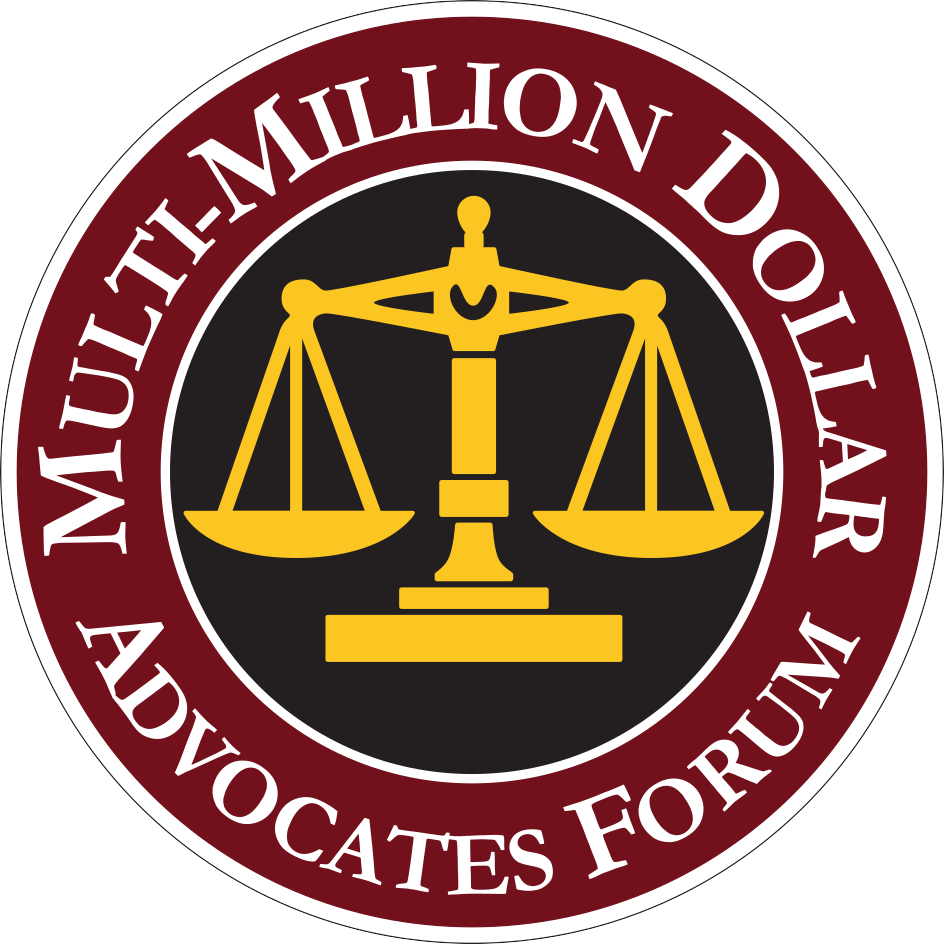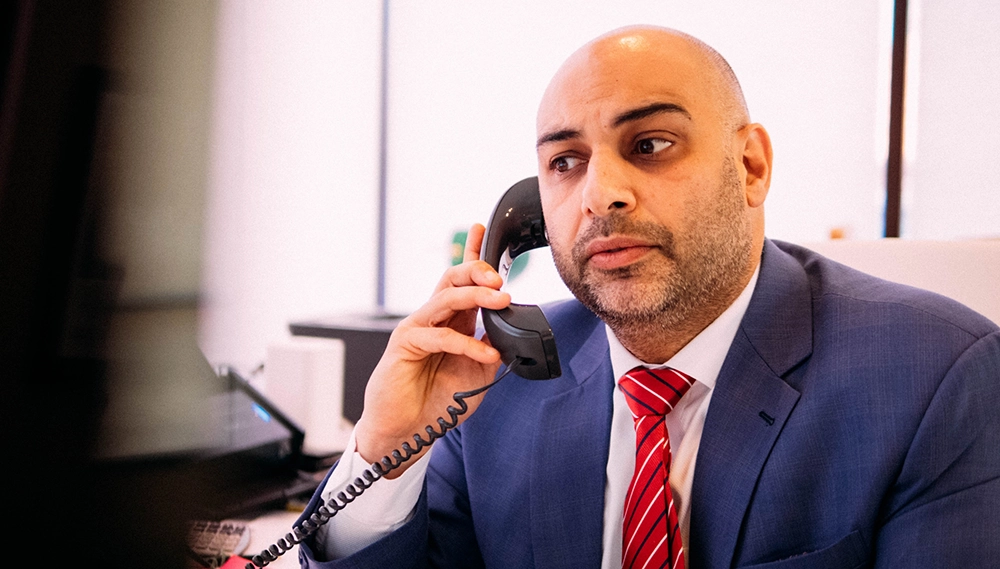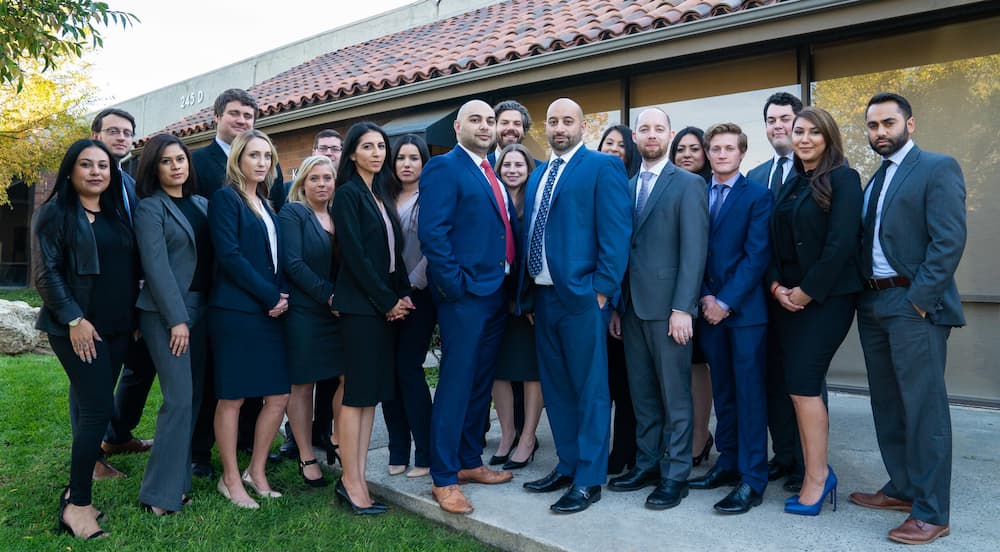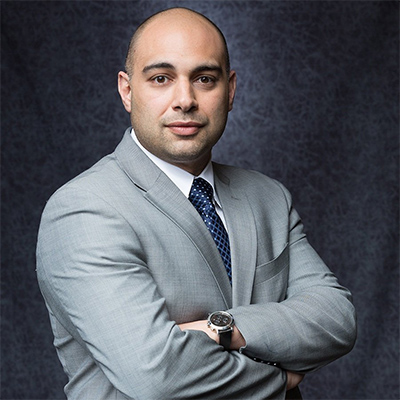Dealing with debt can overwhelm anyone, but debt collectors can cross the line into unbearable harassment. Unfortunately, aggressive debt collection practices continue to grow in New York, causing significant distress to consumers.
If you face unfair and harassing debt collection practices in New York, you do not have to endure this difficult situation alone. At our firm, we understand the frustration and stress of dealing with aggressive debt collectors.
Our experienced New York FDCPA lawyers are here to help fight back against these unlawful tactics. We will work tirelessly to protect your rights and seek justice.
Don’t let the harassment continue; contact Kazerouni Law Group today for a free consultation to discuss your case.
REQUEST A FREE CASE EVALUATION
Why Choose Our New York FDCPA Lawyers

When it comes to fighting debt collection harassment, choosing the right lawyer can make a significant difference in the outcome of your case.
At Kazerouni Law Group, we have the experience and dedication to protect and fight for your rights as a consumer. Here’s why you should choose us:
Experience in Consumer Protection
Our firm has years of experience exclusively handling FDCPA cases in New York and nationwide. We deeply understand the intricacies of debt collection laws and can handle your case with the attention it demands.
Record of Success
We have achieved numerous favorable outcomes for our New York clients who have faced debt collection harassment. Our track record speaks for itself and demonstrates our commitment to securing justice and compensation for those who debt collectors have wronged.
Personalized Approach
At Kazerouni Law Group, we understand that each case is unique and requires a tailored approach. We provide compassionate representation and take the time to understand your specific circumstances. We make your well-being and the protection of your rights our top priorities.
Free Initial Consultation and No Upfront Fees
We offer a free initial consultation to evaluate your case and provide you with the legal guidance you need. Additionally, we work on a contingency fee basis, which means you only pay if we successfully resolve your case. Our clients pay no upfront fees or out-of-pocket costs.
Commitment to Consumer Justice
Kazerouni Law Group is nationally recognized for its dedication to protecting consumers from abusive debt collection practices. We are passionate about upholding consumer rights and ensuring our clients receive the justice they deserve.
Our New York office is conveniently located west of the South Street Seaport Museum and east of the New York Stock Exchange at:
48 Wall Street
Suite 1100
New York, NY 10005
What Is the Fair Debt Collection Practices Act (FDCPA)?
The federal Fair Debt Collection Practices Act (FDCPA) prevents abusive, deceptive, and unfair debt collection practices. Enacted in 1977, the FDCPA sets strict rules and guidelines for debt collectors, ensuring that debt collectors treat consumers fairly throughout the debt collection process.
The FDCPA applies to personal, family, and household debts, including credit card debts, medical bills, and mortgage payments. It prohibits debt collectors from engaging in harmful practices, harassing, or deceptive, giving consumers protection against unethical behavior.
Examples of Prohibited Debt Collection Practices
Under the FDCPA, debt collectors cannot engage in practices that can cause emotional distress and financial harm to consumers.
Some examples of prohibited debt collection practices include:
- Harassment through excessive or threatening calls: Debt collectors cannot call you repeatedly or continuously with the intent to annoy, abuse, or harass you. If you receive an excessive amount of calls from debt collectors, especially during odd hours, it may violate FDCPA.
- Misrepresentation of debt amounts or legal repercussions: Debt collectors cannot deceive or misrepresent the debt you owe or the consequences of not paying it. It includes falsely claiming that police will arrest you if you do not pay or misrepresenting the legal actions that they can take against you.
- Contacting third parties about your debt without permission: Debt collectors are generally prohibited from discussing your debt with anyone other than you, your spouse, or your attorney. If debt collectors contact your friends, family members, or employer about your debt without your consent, it violates the FDCPA.
- Threatening legal action they cannot take: Debt collectors cannot threaten legal action they do not intend to or cannot legally take. They also cannot threaten actions not permitted under the FDCPA, such as threatening to garnish your wages or seize your property without proper legal procedure.
FDCPA Enforcement in New York

While the FDCPA is a federal law, each state can provide additional consumer protections. In New York, additional consumer protection laws work in tandem with the FDCPA to ensure the fair treatment of consumers.
New York has the New York General Business Law, which offers further safeguards against abusive debt collection practices. These laws give consumers additional rights and remedies, enabling them to take legal action against debt collectors who violate their rights.
Recognizing FDCPA Violations in New York
FDCPA can protect your consumer rights. Debt collectors often employ aggressive tactics to collect debts, and you need a lawyer who knows when their actions cross the line. Here are some signs of FDCPA violations in New York:
Persistent Phone Calls at Odd Hours
Receiving many phone calls from debt collectors, especially at unusual hours such as early in the morning or late at night, may violate the FDCPA. The law limits when they can contact you, and persistent calls outside of these established times may constitute harassment.
Threats of Arrest or Wage Garnishment without Legal Basis
Debt collectors cannot threaten you with arrest or wage garnishment unless they have the legal authority. If a debt collector makes empty threats or falsely claims they will take legal action against you, it violates the FDCPA.
Misleading Statements about the Debt or the Collection Process
Debt collectors must provide accurate and truthful information about the amount of debt you owe and the collection process. If they make misleading statements or provide false information, it violates the FDCPA.
Attempts to Collect on Time-Barred Debts
Debt collectors may not pursue debts beyond the statute of limitations, which is the legal timeframe within which a creditor can sue a debtor. If a debt collector tries to collect on a debt that is past the statute of limitations, it violates the FDCPA.
Contacting Your Employer, Friends, or Family Members Inappropriately
Debt collectors should only contact you, your spouse, or your attorney regarding your debt. They generally may not discuss your debt with other parties without your consent. If debt collectors contact your employer, friends, or family members inappropriately, it violates the FDCPA.
REQUEST A FREE CASE EVALUATION
How a New York FDCPA Lawyer Can Help You

Facing debt collection harassment can be an extremely stressful experience. Hiring one of our seasoned New York FDCPA lawyers can provide you with the necessary support and guidance to face the complexities of debt collection laws. Here are some ways a lawyer can help:
Protecting Your Rights Under the FDCPA
A New York FDCPA attorney will ensure that debt collectors comply with all legal requirements outlined in the FDCPA. They will thoroughly evaluate your case, identify violations, and take appropriate legal action to protect your rights.
Stopping Harassment Immediately
Debt collectors often respond more seriously when you have legal representation. A lawyer can issue formal cease-and-desist letters to debt collectors, explicitly informing them to stop all communication and harassment attempts. It can provide immediate relief and put a stop to wrongful practices.
Pursuing Financial Compensation
In cases of FDCPA violations, you may be eligible for financial compensation. A New York FDCPA attorney will advocate for your rights and seek damages. These damages can include statutory damages, emotional distress, and reimbursement for legal fees incurred during the process.
Identifying Additional Violations
Your New York FDCPA lawyer may uncover other illegal practices under New York state laws that can further strengthen your case. They will thoroughly investigate and use their knowledge of federal and state laws to expose all violations committed by debt collectors.
Steps to Take If You Experience Debt Collection Harassment
Experiencing debt collection harassment can distress you, but you can protect yourself and hold debt collectors accountable. Here’s what you should do:
Keep Detailed Records
Maintain a record of all written communications from debt collectors, including letters and emails. Additionally, record details of phone calls, including dates, times, and content. This documentation will serve as valuable evidence of the harassment you have endured.
Avoid Confrontation With Debt Collectors
While it’s natural to feel frustrated and angry, avoid confrontation with debt collectors. Refrain from providing unnecessary information or engaging in threats. Instead, focus on gathering evidence and seeking legal assistance.
Contact Our New York FDCPA Attorneys
To ensure that your rights are fully protected and to evaluate the viability of your case, it is essential to seek legal assistance from our qualified New York FDCPA attorneys. They will guide you through the process, fight for your rights, and help end debt collection harassment.
Common Myths About Debt Collection and the FDCPA

There are many misconceptions surrounding debt collection and the FDCPA. Understanding the truth behind these myths is imperative for protecting your rights. Let’s debunk some common myths:
Myth 1: You Can’t Sue a Debt Collector If You Owe the Debt
Contrary to popular belief, owing a debt does not strip you of your rights. The FDCPA protects consumers regardless of whether or not they owe the debt. Debt collectors must still adhere to the law and treat consumers fairly.
Myth 2: Debt Collectors Can Call You Anytime
Debt collectors are bound by strict rules regarding when and how they can contact consumers. They generally cannot call you at unreasonable hours, such as late at night or early in the morning. Additionally, they cannot contact you repeatedly to annoy or harass you.
Myth 3: Reporting a Debt Collector Won’t Make a Difference
Reporting a debt collector who violates the FDCPA can make a significant difference. By reporting the violation, you initiate an investigation and hold the debt collector accountable for their actions. It can result in consequences for the debt collector and help protect other consumers from similar harassment.
Why You Should Take Action Against FDCPA Violations
Take action against FDCPA violations. Here’s why you should not hesitate to protect your rights:
Regain Peace of Mind
By taking legal action against debt collection harassment, you can eliminate the constant calls, threats, and stress associated with the process. Regaining peace of mind allows you to focus on your financial recovery and future goals.
Hold Debt Collectors Accountable
By standing up against debt collection violations, you can help improve industry practices. Holding debt collectors accountable for their unlawful behavior sends a message that consumers will not tolerate harassment and unfair treatment.
Protect Your Financial Stability
Allowing debt collectors to continue abusive practices can further damage your credit and financial reputation. Taking action against FDCPA violations protects your financial stability and prevents further harm to your financial well-being.

Contact a New York FDCPA Attorney at Kazerouni Law Group for Help Today

If you face debt collection harassment in New York, don’t wait any longer to seek legal assistance. At Kazerouni Law Group, we fight for your rights and ensure you receive the justice you deserve. Contact us today at (800) 400-6808 for a free consultation to discuss your case.
Don’t let debt collectors continue to harass you – take action now to regain control of your financial future and receive the justice you deserve. Contact our New York FDCPA attorneys today for a confidential consultation. We are well-versed in the New York debt collection laws, will listen to your concerns and evaluate your case.